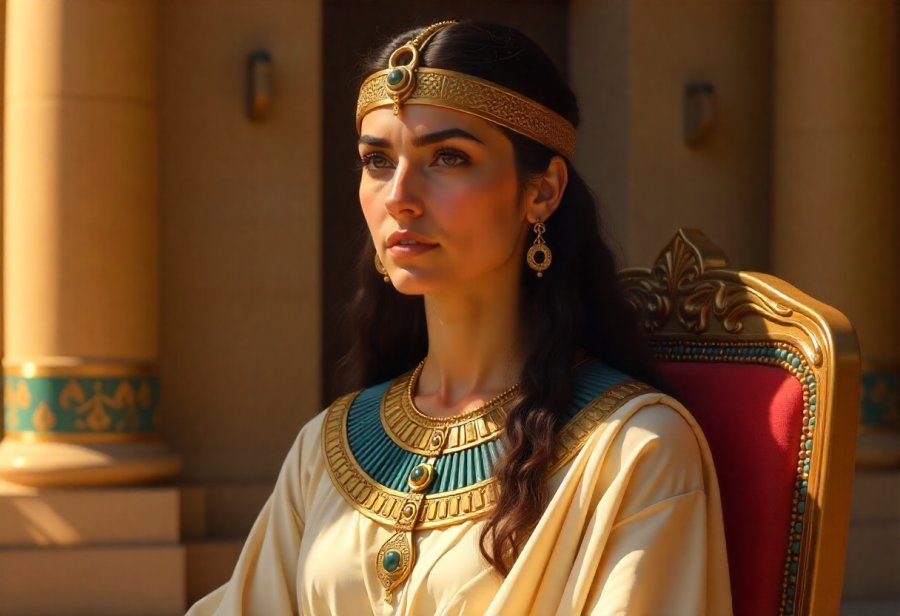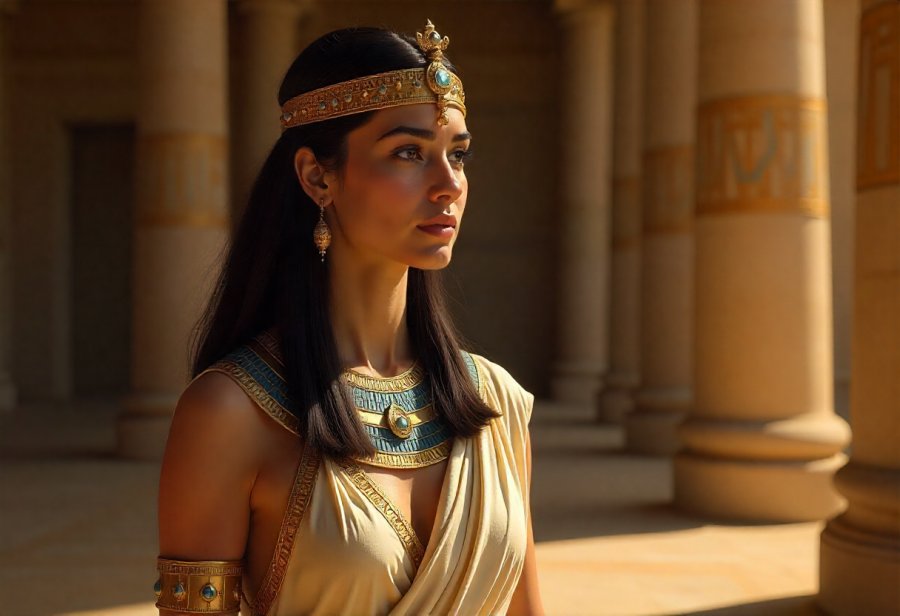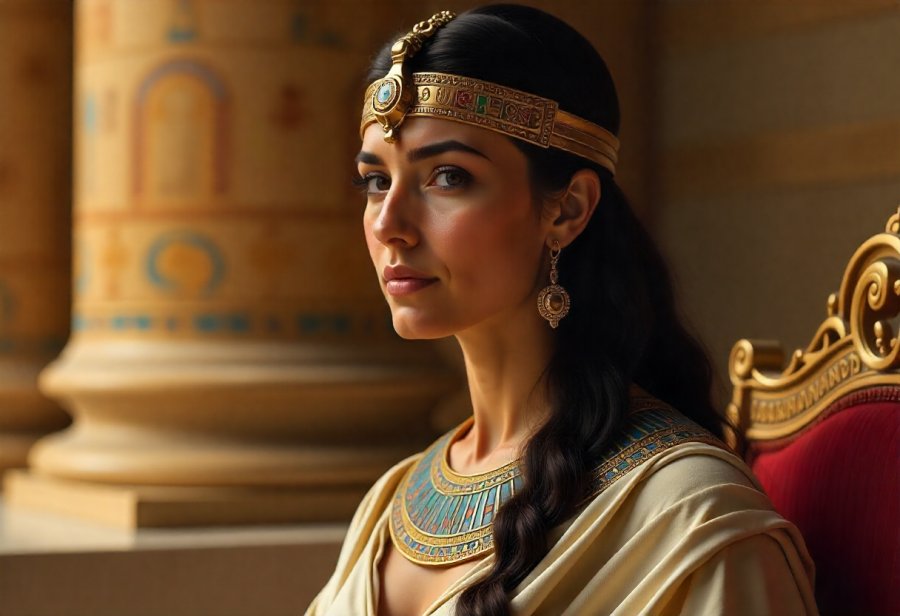
Cleopatra VII is often remembered for her beauty and romantic liaisons, yet her true legacy lies in her sharp intellect, diplomatic prowess, and cultural mastery. This portrayal challenges the myth of a seductress, revealing her as a formidable ruler who navigated Egypt’s turbulent political landscape through strategic alliances, multilingual diplomacy, and cultural diplomacy rooted in Egyptian and Hellenistic traditions. Her leadership was not based on superficial charm but on a deep understanding of human nature, history, and influence. How did her mastery of arts, sciences, and symbols secure her sovereignty? Through a nuanced balance of tradition and innovation, Cleopatra exemplified that true power resides in knowledge, resilience, and adaptability. Her legacy prompts us to reconsider what it means to lead—suggesting that intelligence and cultural insight can leave a far more enduring mark than beauty or myth. Could her real strength be hidden in her mind all along?

Unveiling Cleopatra’s True Legacy: Intelligence Over Glamour
Cleopatra VII is often remembered for her beauty and romantic liaisons with powerful Roman figures, but her true legacy runs much deeper. She was an exceptionally intelligent and strategic ruler who navigated the complex political landscape of her time with remarkable skill. Her leadership was rooted in her sharp mind, extensive education, and multilingual abilities, which allowed her to communicate directly with both allies and rivals. Cleopatra understood that influence came from knowledge and persuasion, not just charm or appearance.
As the last active pharaoh of Egypt, Cleopatra inherited a land rich in history, culture, and strategic importance. Egypt was at a crossroads, caught between the waning influence of the Hellenistic world and the rising power of Rome. She faced the challenge of maintaining her country’s independence amid shifting alliances and external threats. Her ability to balance diplomacy, cultural sensitivity, and political strategy was vital to her survival and success.
Born into the Macedonian Ptolemaic dynasty, Cleopatra’s upbringing combined Greek traditions with Egypt’s ancient religious and cultural roots. She learned multiple languages and was well-versed in arts, sciences, and philosophy from a young age. This education prepared her to rule in a multicultural environment, enabling her to bridge Greek and Egyptian worlds. Her capacity to operate across different cultural spheres was a key element of her leadership, giving her an edge in diplomacy and governance.
Cleopatra’s influence was rooted in her intelligence and strategic insight, not just her physical allure. She understood that true power came from command of knowledge and the ability to persuade. Her mastery of language, her scholarly pursuits, and her understanding of Egyptian religious traditions helped legitimize her authority and foster loyalty among her people. Her diplomatic alliances with Julius Caesar and Mark Antony were driven by long-term political calculation, aimed at protecting Egypt’s independence rather than personal vanity.
Her leadership extended beyond politics. Cleopatra was a patron of arts and sciences, supporting the renowned Library of Alexandria and engaging with scholars from across the Mediterranean. She recognized that fostering knowledge and culture was essential to strengthening her kingdom’s influence and stability. Her commitment to learning reflected her belief that intellectual leadership could elevate Egypt’s stature and secure her legacy.
Ultimately, Cleopatra’s true strength lay in her mind and resilience. Her ability to adapt, her cultural savvy, and her strategic thinking made her a formidable ruler. She demonstrated that influence and power are best wielded through intelligence, diplomacy, and understanding—lessons that remain relevant today. Her story challenges us to value the power of the mind in leadership and history, far beyond superficial appearances or romantic myths.
Deep Dive into Cleopatra’s Leadership: Wisdom, Diplomacy, and Cultural Mastery
Cleopatra’s leadership went far beyond her reputation for beauty; it was rooted in her exceptional intelligence and her ability to navigate a labyrinth of political, cultural, and religious complexities. She was a scholar at heart, engaging deeply with the arts, sciences, and philosophy, which sharpened her strategic thinking and decision-making. Her multilingualism—reportedly speaking several languages—allowed her to communicate directly with foreign leaders and advisors, giving her a significant diplomatic advantage. This skill enabled her to negotiate and build alliances on her own terms, often using cultural and religious symbolism to legitimize her authority.
Her understanding of Egyptian traditions and religious practices was central to her legitimacy. Cleopatra portrayed herself as a divine ruler, blending Egyptian religious iconography with Hellenistic political symbolism. By reviving traditional festivals and venerating Egyptian deities, she fostered loyalty among her people and reinforced her divine right to lead. This cultural diplomacy was complemented by her mastery of political strategy—adapting her alliances and policies as circumstances changed, always aiming to safeguard Egypt’s independence amid the rising tide of Roman power.
Beyond politics, Cleopatra was a patron of knowledge and innovation. She supported the famed Library of Alexandria and was known to engage with scholars across the Mediterranean. Her intellectual pursuits weren’t just personal interests—they were part of a broader vision to elevate Egypt’s status as a hub of learning and culture. This scholarly engagement helped her craft a leadership style rooted in wisdom, inspiring loyalty and respect both at home and abroad. Her ability to merge intellect with authority made her a formidable ruler, capable of influencing the course of history through insight rather than brute force.
What set Cleopatra apart was her capacity to embody both divine authority and pragmatic governance. She recognized that her power depended on a delicate balance—showing reverence for tradition while making shrewd political choices. Her iconic image as a wise and learned ruler was reinforced by her actions: fostering stability through cultural integration, forging strategic alliances, and making decisions based on careful analysis. This blend of spiritual and worldly leadership made her a model of resilience, demonstrating that true influence arises from a deep understanding of human nature, culture, and power.
Her leadership exemplifies that influence rooted in knowledge, adaptability, and cultural sensitivity remains as relevant today as in her time. Cleopatra’s strategic mind and commitment to learning enabled her to navigate turbulent waters and protect her kingdom’s sovereignty. Her legacy reminds us that leadership isn’t just about charisma or appearances—it’s about the ability to think critically, embrace diverse perspectives, and adapt to ever-changing circumstances. Her example continues to inspire those who value intelligence and resilience as the true foundations of lasting influence.

Contrasts and Conflicts: Debunking Myths and Embracing the Real Cleopatra
Throughout history, Cleopatra’s reputation has been shaped by a mix of myth, romanticism, and political storytelling. Roman historians like Plutarch depicted her as a seductress whose beauty and charm swayed powerful men such as Julius Caesar and Mark Antony. These stories emphasized her allure over her intelligence, painting her as a woman whose influence was rooted in personal magnetism rather than political skill. This portrayal persisted through the centuries, reinforcing the idea that her power stemmed mainly from her physical appeal and romantic entanglements.
Over time, cultural biases and societal expectations further colored her image. In art, literature, and religious imagery, she was often cast as an exotic or divine figure, yet her strategic mind was rarely acknowledged. During the Renaissance and into modern times, romanticized portrayals focused heavily on her beauty and passion, overshadowing her diplomatic and political achievements. Hollywood’s 1963 film “Cleopatra,” for example, leaned into glamour and romance, emphasizing her allure over her leadership qualities. These narratives shaped a simplified, often superficial view of her legacy.
This focus on her physical appeal has created a myth that clouds her true accomplishments. The stories of her alliances with Caesar and Antony tend to dominate her story, overshadowing her skills as a diplomat and ruler. Such narratives reduce her to a tragic love story, neglecting her mastery in statecraft, multilingual diplomacy, and cultural diplomacy. They diminish her as a strategic thinker who understood the nuances of power, influence, and long-term stability. By fixating on romance and beauty, these portrayals overlook the depth and complexity of her leadership.
In recent centuries, scholars have challenged these outdated stereotypes. They highlight her diplomatic brilliance, her mastery of Egyptian and Hellenistic traditions, and her ability to blend cultural symbols to legitimize her authority. Far from just a romantic figure, Cleopatra emerges as a formidable leader who used intelligence, cultural savvy, and strategic alliances to preserve Egypt’s independence. Recognizing her as a complex, capable ruler shifts focus from myth to reality, offering a richer, more accurate understanding of her legacy.
Today, reassessment continues as historians and cultural critics aim to strip away romanticized distortions. By focusing on her political ingenuity, scholarly pursuits, and cultural diplomacy, we see Cleopatra as a pioneering female leader whose influence extended beyond personal allure. Her story reminds us that myths often obscure the true power behind historical figures, and that understanding their full complexity offers a deeper appreciation of their lasting impact.
By exploring the true scope of her accomplishments, we gain a more nuanced appreciation of Cleopatra’s leadership. For a more detailed examination of her diplomatic strategies and political achievements, you can read about her legacy at Cleopatra's Biography.
Applying Cleopatra’s Strategies Today: Lessons in Cultural Savvy and Resilient Leadership
Cleopatra’s leadership qualities—her diplomatic finesse, strategic insight, and cultural awareness—still resonate strongly today. In a world increasingly connected and complex, effective leadership demands more than charisma; it requires a genuine understanding of diverse perspectives and the ability to forge authentic alliances. Cleopatra’s talent for navigating different cultural and political landscapes through direct communication and respect for traditions offers a timeless blueprint for modern leaders.
Her emphasis on continuous learning and curiosity remains vital in today’s fast-paced environment. Supporting arts, sciences, and education isn’t just about personal interest—it’s a strategic move that elevates a nation’s influence and innovation. Leaders who prioritize knowledge, foster intellectual growth, and embrace new ideas can adapt more quickly and craft more informed strategies, just as Cleopatra did by supporting Alexandria’s renowned library and scholarly community.
Cultural sensitivity also plays a crucial role in contemporary leadership. Cleopatra’s skill in blending Egyptian religious symbolism with Hellenistic political symbols helped legitimize her authority across diverse audiences. Today, understanding and respecting different cultural values can build trust and reduce misunderstandings in international diplomacy, business negotiations, and community engagement. Leaders who align their messaging with core cultural narratives foster loyalty and credibility, much like Cleopatra’s strategic use of symbolism.
Building genuine relationships based on mutual benefit, rather than superficial charm, remains a cornerstone of lasting influence. Cleopatra’s alliances with Julius Caesar and Mark Antony exemplified this approach—long-term interests, strategic trust, and shared goals mattered more than surface-level appeal. Modern leaders can learn from this by focusing on transparency, shared values, and authentic collaboration to create resilient partnerships that withstand changing circumstances.
Messaging and symbolism continue to be powerful tools for influence. Cleopatra’s use of rituals, festivals, and iconography to reinforce her divine right demonstrates how authentic storytelling can inspire loyalty and allegiance. Today, crafting narratives that resonate deeply with audiences—whether in politics, branding, or social movements—can strengthen bonds and foster a sense of shared purpose. Cleopatra’s mastery of symbolism reminds us that influence is often rooted in the stories we tell and how we align them with collective values.
Ultimately, her example shows that effective leadership hinges on the integration of knowledge, cultural awareness, and adaptability. Cleopatra’s ability to think critically, embrace diversity, and respond to changing circumstances enabled her to protect Egypt’s sovereignty and influence. In our interconnected world, these qualities remain essential. Leaders who prioritize understanding, resilience, and continuous learning can navigate today’s challenges with the same strategic acumen Cleopatra demonstrated centuries ago.

Full Circle: Rediscovering Cleopatra’s Power Through Her Mind, Resilience, and Strategic Vision
Cleopatra’s true power extended far beyond her reputation for beauty or romance. It lay in her sharp mind, strategic insight, and deep understanding of the complex political and cultural landscapes she navigated. Her ability to forge alliances, such as those with Julius Caesar and Mark Antony, wasn’t driven by vanity but by careful diplomacy and long-term vision. She knew influence stemmed from knowledge, adaptability, and her skill in cultural diplomacy.
Her mastery of Egyptian traditions and Hellenistic politics allowed her to craft a unique authority rooted in both divine symbolism and pragmatic governance. By blending religious rituals with political strategy, she fostered loyalty and legitimacy that went beyond superficial appearances. Her leadership was a sophisticated balance—embodying spiritual authority while making shrewd decisions—demonstrating that true influence is built on cultural awareness and strategic insight.
Cleopatra’s legacy is most enduring when viewed through the lens of her intellect and resilience. Her multilingual abilities, patronage of arts and sciences, and diplomatic finesse reveal a ruler who prioritized wisdom over superficial charm. She understood that lasting influence depends on understanding your environment, making informed decisions, and forging alliances based on mutual benefit. This approach helped her protect Egypt’s sovereignty amid external pressures and internal challenges.
Reassessing her story shifts focus away from myths and romanticized tales towards a recognition of her as a pioneering leader. She was a woman who used intelligence, cultural savvy, and strategic thinking as her primary tools of power. Her story challenges us to value mental acuity and resilience—qualities that have proven timeless and relevant, regardless of the era. Cleopatra’s influence was a product of her mind, and that’s what makes her legacy so compelling.
Her ability to think critically, adapt to changing circumstances, and wield influence through insight and cultural understanding set her apart. She demonstrated that leadership rooted in knowledge, flexibility, and strategic foresight can leave a mark that endures far longer than superficial allure. Her example reminds us that true power lies in resilience and intellect, not just appearance or charm.
Far from being a tragic figure of romance, Cleopatra emerges as a visionary ruler who understood the importance of cultivating influence from within. Her leadership was about mastering the art of diplomacy, understanding her people’s beliefs, and making decisions grounded in wisdom. This deep, strategic approach to leadership is what secured her place in history—not her beauty, but her brilliance.
Today, her story encourages a reevaluation of what it means to lead effectively. It’s a reminder that genuine influence comes from a combination of knowledge, cultural awareness, and resilience. Cleopatra’s legacy shows that leadership driven by intellect and strategic thinking can withstand the test of time, inspiring future generations to prioritize wisdom over superficiality.
In the end, Cleopatra’s true power was her ability to see beyond the immediate and understand the long game. Her influence was rooted in her mind and her capacity to adapt, persuade, and inspire loyalty through insight rather than appearance. This is her lasting gift—a testament to the strength of leadership fueled by resilience, intelligence, and cultural understanding. Her story remains a powerful example that genuine influence is built from the inside out, not from fleeting beauty or myth.


